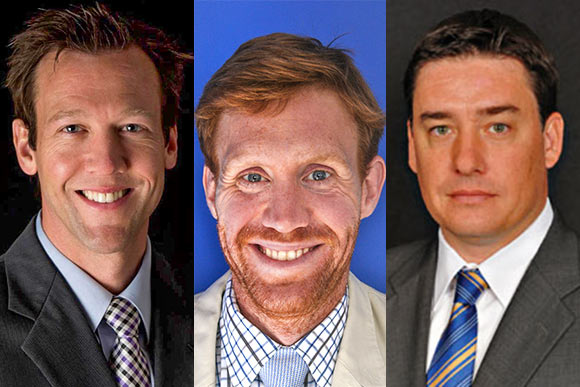ceo-in-residence program brings top biomedical execs to cle to head startups
After growing up on Cleveland’s east side, Bill Fuller headed for North Carolina in 1990. He returned briefly in the 2000s, but he didn’t think he’d ever come back. But when BioEnterprise asked him in 2013 to become its newest CEO-in-Residence, he couldn’t resist the opportunity.
Through the program, Fuller was given a team of advisors, access to investors, a salary – albeit significantly less than what he was making with his 15 years as an executive in the medical device industry -- and 18 months to find a biomed company worth starting and nurturing.
Within 11 months, Fuller became CEO of Centerline Biomedical, a Cleveland-based Cleveland Clinic Innovations spinoff with a technology designed to reduce radiation exposure to patients and caregivers during endovascular procedures.
“The BioEnterprise CEO-in-Residence program brought me back to Cleveland,” says Fuller. “The program gave me the chance to start my own company with unique access to infrastructure, industry experts, and venture capital to aid in the success of the company.”
BioEnterprise created the program in 2008, hiring two to three CEOs-in-Residence each year. “The idea is we’ve got a really great pipeline of emerging technologies and very robust biomed technologies,” explains Aram Nerpoouni, CEO and president of BioEnterprise. “There are not a lot of experienced biomed CEOs, so who’s going to run the company in the early stages?”
Nerpouni says the CEOs-in-residence usually identify early stage companies with great ideas that need an experienced CEO to help get it off the ground and raise funding. Most of them are boomerangs.
Fuller says BioEnterprise made the process of launching a company seamless. “They have connections to venture capital, grants and angel investors,” he says. “It’s a great catalyst for this region to have executives come in and set up.”
Al Hawkins, another Cleveland native who settled in Boston, joined the CEO-in-Residence program in January 2011 and formed three gene therapy companies during his time there: Milo Biotechnology, which develops therapies for muscular dystrophy; Abeona Therapeutics, which works on treatments for Sanfilipo Disease; and Deep Brain Innovations – all based on technology licensed from hospitals.
The CEO-in-Residence program was just what Hawkins was looking for to pursue his interests and start companies. “It’s the best job I’ve ever had,” he says. “They paid me and gave me the infrastructure and support I needed to start some companies.” While he is still CEO of Milo and chairman of Abeona, Hawkins also serves as vice president of business development for BioMotiv.
Jon Snyder, founder, president and CEO of Neuros Medical, was BioEnterprise’s first entrepreneur-in-residence. With more than 25 years in sales, marketing and operations with companies like Steris and Houston-based Cyberonics, Snyder found his career was preparing him to launch his own company.
“I always took something on in a new area or new role just to build my skill set,” Snyder says. “In my career I was planning this vision around technology." In 2008 he returned to Cleveland from Chicago for the opportunity to explore starting a business in implantable neurostimulation.
“It was a challenging time to put a company together and fund it,” Snyder recalls. But we raised $2 million in 2009 and moved the company through the initial phase.” Today, Neuros medical has just begun its final study on its Altius nerve block technology for pain management in amputees. The next step is FDA approval.
The resources BioEnterprise provided were invaluable in developing a tech-based company during a recession when investors were pulling out of Cleveland biomed companies. “I definitely enjoyed my time as CEO-in-Residence,” Snyder says. “BioEnterprise helped vet ideas as they were coming together. And they provided office space, made introductions and help execute the license agreement.”



